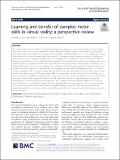Learning and transfer of complex motor skills in virtual reality: a perspective review
Author(s)
Levac, Danielle E; Huber, Meghan E; Sternad, Dagmar
Download12984_2019_Article_587.pdf (962.6Kb)
Publisher with Creative Commons License
Publisher with Creative Commons License
Creative Commons Attribution
Terms of use
Metadata
Show full item recordAbstract
The development of more effective rehabilitative interventions requires a better understanding of how humans learn and transfer motor skills in real-world contexts. Presently, clinicians design interventions to promote skill learning by relying on evidence from experimental paradigms involving simple tasks, such as reaching for a target. While these tasks facilitate stringent hypothesis testing in laboratory settings, the results may not shed light on performance of more complex real-world skills. In this perspective, we argue that virtual environments (VEs) are flexible, novel platforms to evaluate learning and transfer of complex skills without sacrificing experimental control. Specifically, VEs use models of real-life tasks that afford controlled experimental manipulations to measure and guide behavior with a precision that exceeds the capabilities of physical environments. This paper reviews recent insights from VE paradigms on motor learning into two pressing challenges in rehabilitation research: 1) Which training strategies in VEs promote complex skill learning? and 2) How can transfer of learning from virtual to real environments be enhanced? Defining complex skills by having nested redundancies, we outline findings on the role of movement variability in complex skill acquisition and discuss how VEs can provide novel forms of guidance to enhance learning. We review the evidence for skill transfer from virtual to real environments in typically developing and neurologically-impaired populations with a view to understanding how differences in sensory-motor information may influence learning strategies. We provide actionable suggestions for practicing clinicians and outline broad areas where more research is required. Finally, we conclude that VEs present distinctive experimental platforms to understand complex skill learning that should enable transfer from therapeutic practice to the real world.
Date issued
2019-10-18Department
Massachusetts Institute of Technology. Department of Mechanical EngineeringJournal
Journal of NeuroEngineering and Rehabilitation
Publisher
BioMed Central
Citation
Levac, Danielle E., Meghan E. Huber, and Dagmar Sternad. "Learning and transfer of complex motor skills in virtual reality: a perspective review." Journal of NeuroEngineering and Rehabilitation. 16, 1 (Oct. 2019): no. 121 doi 10.1186/s12984-019-0587-8 ©2019 Author(s)
Version: Final published version
ISSN
1743-0003